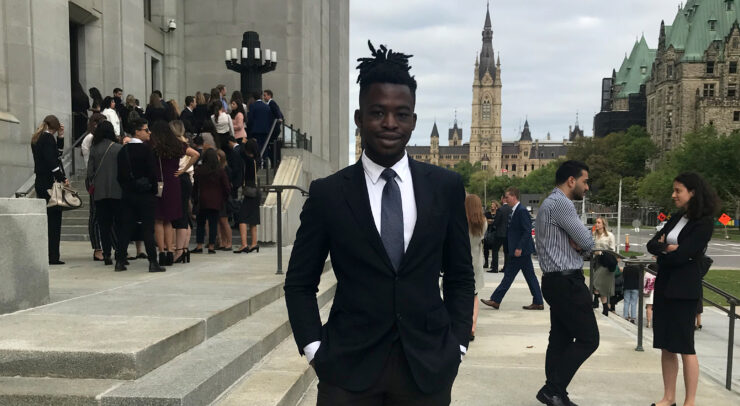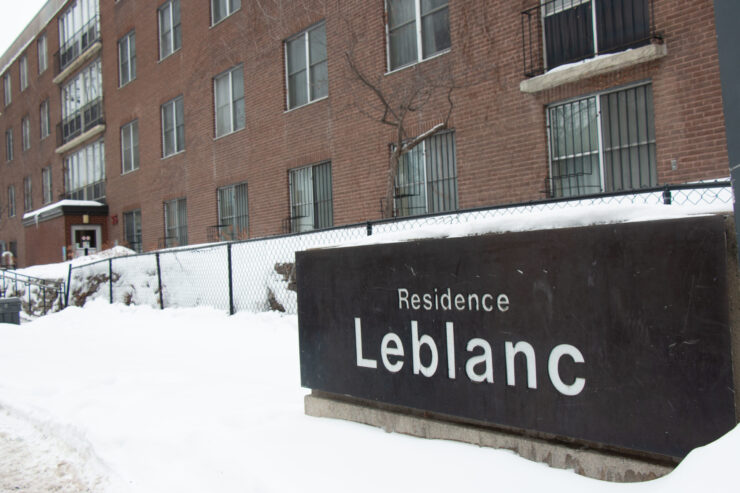Chandru calls for review of protection services procedures and aims to improve mental health services
This interview is part of our series of articles profiling the candidates for the University of Ottawa’s Board of Governors undergraduate student representative seat in the upcoming election that will be held from June 2-4. The University will email a ballot to students who are eligible to vote in the election and will announce the results on June 5. All eight candidates were asked the same set of questions for consistency. Answers have been edited for length and clarity. These questions were answered via Facebook.
The Fulcrum: Can you give me in a couple of sentences a short description of yourself?
Showmia Chandru: Absolutely, I’m a third-year U of O student in international development and globalization. In my free time, you can probably find me volunteering in grassroots organizations, running my up-cycling charity apparel brand, and writing articles regarding activism and current events. I also really love photography and graphic design, but that is just a hobby for me.
The Fulcrum: Why are you running for a seat on the BOG?
SC: I have always had been very involved in my community, I was raised with the notion that progress doesn’t happen single handily, it takes a village.
Upon hearing about the BOG election I immediately started to think of ways to improve and develop the campus. I know I have the experience, the means, and the ideas to sit at the table so how could I pass up on an opportunity to actually do something about it.
The Fulcrum: What previous experience do you think will help you in this role?
SC: I believe that there should be a member on the board that hasn’t just been heavily involved in politics. If I am representing the voice of the student body, I need to have experience working with them and the surrounding community.
I have several years of experience working with civic action centres for community development, student-mentor programs, and awareness centres for mental health. I’ve also been the lead for campaigns to push for mental health initiatives in my community back in the GTA, and I’ve been a teacher for kids and teenagers alike for a good chunk of my life.
My experience is with people, activism, development, and I want to apply the skills I gained in those spaces to improve our campus through a grass-roots approach; one step at a time.
The Fulcrum: In your own words, what is the role of the student rep on the BOG?
SC: Anyone can search up the role and tell you it is a seat that allows you to be responsible for the universities overall governance and management, but to me, it is a role that gives me the opportunity to work towards being the voice of the student body in these processes and molding the school into something we should be proud to be a part of.
The Fulcrum: Can you talk about what your plan to do to make campus a better place?
SC: Sure, so there’s a whole lot of initiatives and ideas I want to implement but I would have to say that my main plans I have surround:
- First, making the campus a safer space for students, so for instance, I plan on calling for a review of Protection Services procedures to diminish any presence of wrongful intervention with students. We all have heard about the big incidents surrounding campus discrimination, but there are so many more complaints and cases of racial profiling that go unresolved. I want accountability and prevention.
- Secondly, I want to address the mental health crisis. Do we have a system in place? Yes. But is it the best it can be considering the resources we have? No. I want to allocate more therapists, more clinics, and more resources for mental health beyond a telephone line so there isn’t a month to three-month-long waiting period just to get started on the process of healing. I’ve been in that situation where I’ve been in the lowest point of my life in an isolating city as a first-year, my experience was an hours-long wait to get a prescription at the clinic, and a three-month wait list just to get approved for therapy. We need a more evolved and efficient system to suit the diverse needs of our students.
- Thirdly, I want more accessibility for our students. I’ve looked at the budget reports and I believe that there is room to put more funding in daycare programs for parents with kids. I also want a re-evaluation of the standards of food in the cafeteria. I also want to work towards reducing or delaying the late fees for tuition payment, if someone’s struggling to pay we shouldn’t give them more expenses. I want to also consider the possibility of paying tuition in installments rather than all upfront per semester. I can talk about the big things all day but our campus life is just as defined by the little things too. I think students would appreciate a later closing time for buildings so they can study longer, or more system maintenance checks for the elevators that are constantly down, or the spotty wifi in residences and study buildings, or a more eco-mode of transportation like bikes.
- Last but not least I want to have more student involvement in these decisions. If there is a meeting happening regarding the state of the student body services I think it is a fair ask to be involved in the process. We could do an online vote for these decisions on a monthly basis after the board deals with the finance and logistics, or appoint a seat towards interacting with students and finding out what they want. There’s no reason for the student body to be shut out of the process.
The Fulcrum: Can you talk about what you’ll do to address UOttawa’s mental health crisis on the BOG?
SC: I remember reading that there were six suicides (officially accounted for) associated with the university and all we got to show for it was a few counsellors and a walk-in clinic.
I have used the mental health services that the school offers and it took months to see any results. Even after I was assigned a therapist there wasn’t any flexibility offered to me regarding making and rescheduling appointments.
The university has an operating budget of $800 million. No one can tell me there’s no room for the rearrangement of finance distribution to allocate for a more aggressive approach towards improving mental health services. Mental health is a 24/7 issue, and the U of O has limited their mental help hours to 9-5 p.m.
We can do better than that.
We need to extend therapy, psychiatric, and clinic hours and employ more professionals. I want to have therapy specific to faculties instead of just a general system, the university has to start acknowledging the student body as a collective of individuals with diverse needs and a handful of doctors for 40,000 students is incredibly inadequate.
But beyond on-campus help, we also need more coverage from professional private counsellors as well. We have thousands of international students that pay a significantly higher rate of tuition, yet there aren’t enough multi-lingual services for them to use. We should also have more mental health awareness campaigns, in 2020 it’s still a hushed topic on campus and many students don’t have the support or means to seek the help they need.
With 39 per cent of students dealing with at least one mental illness, we have no choice but to work towards normalizing the concept. In my opinion, there’s room for improvement in all aspects of the mental health system, and we can’t hope for change without the financial support from the BOG to make those much-needed improvements.
The Fulcrum: Will you advocate for lowering tuition fees?
SC: Yes, indubitably. The university wants to implement a 5.5 per cent increase for international students. After a couple of these tuition hikes and looking at the quality of services we receive, you have to question what our tuition is going towards if not the betterment of our campus and well-being of our student body.
Fulcrum: Will you push for more accountability and the public release of the report on the Wiliston Mason carding incident?
SC: Yes.
One of the ideas I want to implement on the BOG is to reduce the intervention of protection services on campus. Racial profiling is a huge issue that isn’t acknowledged as it should be. We go to a supposedly liberal school and yet minority students are constantly attacked.
Black students shouldn’t have to worry about their safety on campus.
First, it was Jamal Boyce, then it was Wiliston Mason. These are just the cases we’ve heard of because of the student body, without active protest there would be no accountability or actions taken towards the review of campus police procedures.
I refuse to sit idle while incident after incident occurs.
The Fulcrum: Finally, Why should students vote for you over the other candidates?
SC: Your vote isn’t a vote for me, it’s a vote for a better campus.
I am 100 per cent dedicated to making this campus a better place and I won’t settle for less than what the student body needs.
This is your school and your campus so I encourage you to take action and read all of our platforms, ask questions endlessly, and then decide who will champion the changes you want to be made.
Vote for a new direction that will genuinely represent your voice and do your aspirations justice.






